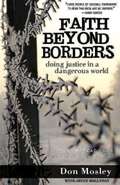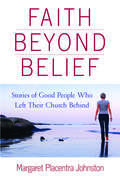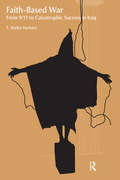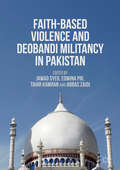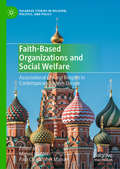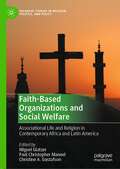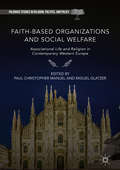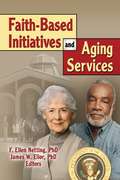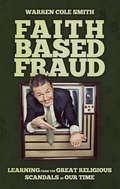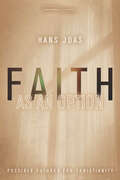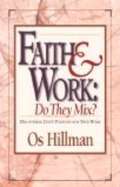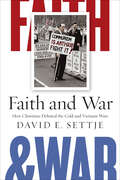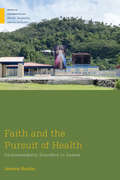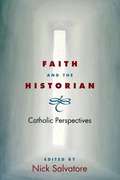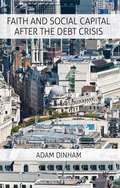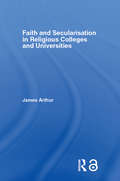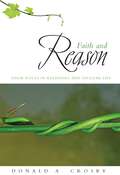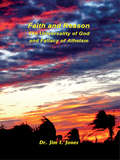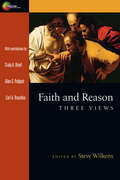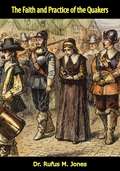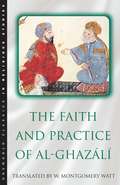- Table View
- List View
Faith Beyond Borders: Doing Justice in a Dangerous World
by Joyce Hollyday Don MosleyFor more than thirty years, Don Mosley has traveled the globe, working for the cause of justice on behalf of two organizations he helped to found: Habitat for Humanity and Jubilee Partners, a community of believers who have welcomed 3,000 refugees from danger zones around the world. In this book, he uses stories from his remarkable walk of faith to issue an action call for Christians to live out the teachings of Jesus, no matter where they take us or what they require us to do.
Faith Beyond Belief
by Margaret Placentra JohnstonFaith Beyond Belief gives a much-needed voice to the "good" people who have left their church but whose spirituality continues to mature. Johnston uses first-person stories as well as known spiritual authorities in describing various stages of religious growth. Some of these real-life accounts are by nonbelievers; others are by those among the growing numbers of the "spiritual but not religious." All are thoughtful people with too much integrity to live what they consider a lie.The stories of the nonbelievers-including an ex-Catholic, a former Mormon, and a clandestine Muslim apostate who left his community after the attacks of 9/11-show how complete confidence in human reason can lead away from literal religious interpretation. But, while that step is a necessary one on the spiritual path, it is only intermediate. Her second set of stories are of people at the "mystic" level who can tolerate paradox and see truth and reality as multidimensional.Johnston's book will help doubters to see things in a new light as well as those who are struggling to clarify their own spiritual vision. It also points beyond the atheist/believer controversy wrecking such divisive havoc in our culture today.
Faith Beyond Belief
by Margaret Placentra JohnstonFaith Beyond Belief gives a much-needed voice to the "good" people who have left their church but whose spirituality continues to mature. Johnston uses first-person stories as well as known spiritual authorities in describing various stages of religious growth. Some of these real-life accounts are by nonbelievers; others are by those among the growing numbers of the "spiritual but not religious." All are thoughtful people with too much integrity to live what they consider a lie. The stories of the nonbelievers-including an ex-Catholic, a former Mormon, and a clandestine Muslim apostate who left his community after the attacks of 9/11-show how complete confidence in human reason can lead away from literal religious interpretation. But, while that step is a necessary one on the spiritual path, it is only intermediate. Her second set of stories are of people at the "mystic" level who can tolerate paradox and see truth and reality as multidimensional.Johnston's book will help doubters to see things in a new light as well as those who are struggling to clarify their own spiritual vision. It also points beyond the atheist/believer controversy wrecking such divisive havoc in our culture today.
Faith-Based War: From 9/11 to Catastrophic Success in Iraq (Religion and Violence)
by T. Walter HerbertThe American invasion of Iraq was largely governed by faith-based policy. The "shock and Awe" strategy, alongside a grossly mismanaged occupation, led to the loss of American lives. Faith-Based War presents an analysis of the imperialist Christian militarism behind the Bush Administration. America’s self-perception as God’s Chosen is examined and its catastrophic results detailed. The book offers an ethical, political and theological perspective on the perversion of Christian teaching behind the war in Iraq and the moral culpability of the American empire.
Faith-Based Violence and Deobandi Militancy in Pakistan
by Jawad Syed Edwina Pio Tahir Kamran Abbas ZaidiThis book documents and highlights the Deobandi dimension of extremism and its implications for faith-based violence and terrorism. This dimension of radical Islam remains largely ignored or misunderstood in mainstream media and academic scholarship. The book addresses this gap. It also covers the Deobandi diaspora in the West and other countries and the role of its radical elements in transnational incidents of violence and terrorism. The specific identification of the radical Deobandi and Salafi identity of militants is useful to isolate them from the majority of peaceful Sunni and Shia Muslims. Such identification provides direction to governmental resources so they focus on those outfits, mosques, madrassas, charities, media and social medial channels that are associated with these ideologies. This book comes along at a time when there is a dire need for alternative and contextual discourses on terrorism.
Faith-Based Organizations and Social Welfare: Associational Life and Religion in Contemporary Eastern Europe (Palgrave Studies in Religion, Politics, and Policy)
by Miguel Glatzer Paul Christopher ManuelThis volume seeks to understand the role and function of religious-based organizations in strengthening associational life through the provision of social services, thereby legitimizing a new role for faith in the formerly secular public sphere. Specifically, we explore how a church in a postcommunist setting, during periods of economic growth and recession in the wake of transitions to capitalism, and with varied numbers of adherents, might contribute to welfare services in a new political regime with freedom of religion. Put another way, what new pressures would be placed on the secular welfare state if religious organizations (Orthodox, Catholic, Protestant, Muslim, others) simply stopped offering their services? By examining public perceptions of the church, changing dynamics of religiosity, and church-state-civil society relations, the volume places these issues in context.
Faith-Based Organizations and Social Welfare: Associational Life and Religion in Contemporary Africa and Latin America (Palgrave Studies in Religion, Politics, and Policy)
by Miguel Glatzer Paul Christopher Manuel Christine A. GustafsonThe case studies in this volume examine the activities of faith-based institutions in a representative sample of African and Latin American countries, including societies with and without a dominant religious tradition, and states with different levels and types of government-provided social services. Among other questions, the chapters examine the types of social service activities faith-based organizations engage in; their effect on civil society and democratic processes; their influence on the character of local and national communities; and what new pressures would be brought to bear on state-provided services if these faith-based organizations ceased to exist.
Faith-Based Organizations and Social Welfare: Associational Life And Religion In Contemporary Western Europe (Palgrave Studies in Religion, Politics, and Policy)
by Paul Christopher Manuel Miguel GlatzerThis volume examines the role and function of religious-based organizations in strengthening associational life in a representative sample of West European countries: newly democratized and long-established democracies, societies with and without a dominant religious tradition, and welfare states with different levels and types of state-provided social services. It asks how faith-based organizations, in a time of economic crisis, and with declining numbers of adherents, might contribute to the deepening of democracy. Throughout, the volume invites social scientists to consider the on-going role of faith-based organizations in Western European civil society, and investigates whether the concept of muted vibrancy aids our theoretical understanding.
Faith-Based Initiatives and Aging Services
by F. Ellen Netting James W EllorGain an understanding of the increased role religious congregations now play in providing social support to the elderlyReligious congregations and faith-based organizations (FBO) from the Jewish, Christian, and Islamic traditions have worked on behalf of older adults for centuries. But the initiation of President Bush&’s Office of Faith-Based Initiatives has raised many questions from both the traditional secular and sectarian services as well as many nontraditional services found in each community. Faith-Based Initiatives and Aging Services addresses the issues of the separation of church and state, the concerns involved in developing social services in religious congregations, and the larger public policy implications of this office. This unique book offers perspectives from traditional and nontraditional faith-based groups, as well as experts in volunteerism.The enactment by Congress of the Charitable Choice section of the federal welfare reform law combined with the creation of the Center for Faith-Based and Community Initiatives in the United States Department of Health and Human Services to signal a high-level of interest in supporting faith-based organizations. Faith-Based Initiatives and Aging Services focuses on the specific applications of services provided by religious congregations. Editors F. Ellen Netting and James W. Ellor conducted an in-depth interview with Elizabeth Seal-Scott, then Director of the Center for Faith-Based and Community Initiatives (an edited transcript of the interview is included in the book) to help promote understanding of the development and implementation of faith-based, grass roots programs.Faith-Based Initiatives and Aging Services examines: the separation of church and state Baptist perspectives on faith-based initiatives and religious liberty managing older volunteers faith organizations and ethnically diverse elders the heritage of religion and spirituality in the field of gerontology faith-related agencies and their implications for aging services the role of religious congregations in the social service systemFaith-Based Initiatives and Aging Services is an essential resource for anyone interested in developing programs for older adults in religious congregations, for human services staffs seeking to work with faith-based initiatives, and for government workers in need of a better understanding of faith-based services in their community.
Faith-Based Fraud: Learning from the Great Religious Scandals of Our Time
by Warren Cole SmithA leader of Ministry Watch examines how cases of abuse and financial corruption have hurt the church—and how to bring back integrity. We live in a secular, skeptical, and cynical age. Many Americans have lost faith in institutions—including the church. Although the vast majority of Christian leaders serve faithfully, examples of financial fraud, greed, sexual and emotional abuse, and other systemic problems are almost everyday occurrences. And a watching world has a right to ask even those who are faithful ministers of the Gospel: &“If you knew this was happening, why didn&’t you say something?&” Whether or not honest and above-board Christian leadership like it, in the eyes of the world, our silence makes us complicit. That&’s why this vital book takes a clear-eyed look at scandals in the church—from Jim and Tammy Bakker&’s PTL Network to Mark Driscoll, Todd Bentley, David Jeremiah, and Bill Hybels. It is an answer to those who say that the silence of Christian leadership is approval. And although this book is sometimes tough on the church and its leaders, its purpose is not to tear down the evangelical church, but to restore it to its rightful place of influence in the culture and in the lives of people who desperately need its message of grace and truth. &“Explains why shining sunlight on churches and ministries in America is important.&” —Paul Glader, Director of the McCandlish Phillips Journalism Institute, The King&’s College
Faith as an Option: Possible Futures for Christianity
by translated by Alex Skinner Hans JoasMany people these days regard religion as outdated and are unable to understand how believers can intellectually justify their faith. Nonbelievers have long assumed that progress in technology and the sciences renders religion irrelevant. Believers, in contrast, see religion as vital to society's spiritual and moral well-being. But does modernization lead to secularization? Does secularization lead to moral decay? Sociologist Hans Joas argues that these two supposed certainties have kept scholars from serious contemporary debate and that people must put these old arguments aside in order for debate to move forward. The emergence of a "secular option" does not mean that religion must decline, but that even believers must now define their faith as one option among many. In this book, Joas spells out some of the consequences of the abandonment of conventional assumptions for contemporary religion and develops an alternative to the cliché of an inevitable conflict between Christianity and modernity. Arguing that secularization comes in waves and stressing the increasing contingency of our worlds, he calls upon faith to articulate contemporary experiences. Churches and religious communities must take into account religious diversity, but the modern world is not a threat to Christianity or to faith in general. On the contrary, Joas says, modernity and faith can be mutually enriching.
Faith (Angels on Assignment)
by Alyssa Renee AbrahamIn this book, your angel friend, Faith, has some exciting adventures to share with you.
Faith and Work: Discovering God’s Purposes for Your Work
by Os Hillman"I have just finished reading Faith & Work: Do They Mix?. Thank you so much for writing it and making it so readily available. Having recently read Ed Silvoso's book, Anointed for Business, I was prepared for yours to be similar. However, I found your book to be very complementary and to go much deeper regarding individual Christian's walk in the marketplace. Both books are inspirational and were a real revelation to me."-Dennis, AustraliaDiscover God's promises for your work. When you go to work on Monday, do you take your faith with you? Whether you're in an office, on a construction site, or at home, we all need to experience God in our work. This valuable resource brings the reader to a greater understanding of what God thinks about our work, how He calls us to our trade, and how we can bring our faith along with us on Monday mornings. This book will encourage you to find purpose and meaning in your work life!
Faith and War: How Christians Debated the Cold and Vietnam Wars
by David E SettjeThroughout American history, Christianity has shaped public opinion, guided leaders in their decision making, and stood at the center of countless issues. To gain complete knowledge of an era, historians must investigate the religious context of what transpired, why it happened, and how. Yet too little is known about American Christianity’s foreign policy opinions during the Cold and Vietnam Wars. To gain a deeper understanding of this period (1964-75), David E. Settje explores the diversity of American Christian responses to the Cold and Vietnam Wars to determine how Americans engaged in debates about foreign policy based on their theological convictions. Settje uncovers how specific Christian theologies and histories influenced American religious responses to international affairs, which varied considerably. Scrutinizing such sources as the evangelical Christianity Today, the mainline Protestant ,Christian Century, a sampling of Catholic periodicals, the African Methodist Episcopal Church, the Southern Baptist Convention, and the United Church of Christ, Faith and War explores these entities' commingling of religion, politics, and foreign policy, illuminating the roles that Christianity attempted to play in both reflecting and shaping American foreign policy opinions during a decade in which global matters affected Americans daily and profoundly.
Faith and the Pursuit of Health: Cardiometabolic Disorders in Samoa (Medical Anthropology)
by Jessica HardinFaith and the Pursuit of Health explores how Pentecostal Christians manage chronic illness in ways that sheds light on health disparities and social suffering in Samoa, a place where rates of obesity and related cardiometabolic disorders have reached population-wide levels. Pentecostals grapple with how to maintain the health of their congregants in an environment that fosters cardiometabolic disorders. They find ways to manage these forms of sickness and inequality through their churches and the friendships developed within these institutions. Examining how Pentecostal Christianity provides many Samoans with tools to manage day-to-day issues around health and sickness, Jessica Hardin argues for understanding the synergies between how Christianity and biomedicine practice chronicity.
Faith and the Historian: Catholic Perspectives
by Nick SalvatoreFaith and the Historian collects essays from eight experienced historians discussing the impact of being "touched" by Catholicism on their vision of history. That first graduate seminar, these essays suggest, did not mark the inception of one's historical sensibilities; rather, that process had deeper, and earlier, roots. The authors--ranging from "cradle to the grave" Catholics to those who haven't practiced for forty years, and everywhere in between--explicitly investigate the interplay between their personal lives and beliefs and the sources of their professional work. A variety of heartfelt, illuminating, and sometimes humorous experiences emerge from these stories of intelligent people coming to terms with their Catholic backgrounds as they mature and enter the academy. Contributors include: Philip Gleason, David Emmons, Maureen Fitzgerald, Joseph A. McCartin, Mario T. Garcia, Nick Salvatore, James R. Barrett, and Anne M. Butler.
Faith and Social Capital After the Debt Crisis
by Adam DinhamThis book explores what becomes of faiths when seen as social capital. In the grip of the current debt crisis, where the social and capital seem increasingly unbalanced, this book examines whether faiths can help rebalance society through drawing communities together.
Faith and Secularisation in Religious Colleges and Universities
by James ArthurThis book is a detailed study of higher education institutions affiliated to particular religions. It considers the debates surrounding academic freedom, institutional governance, educational policy, mission and identity together with institutions’ relations with the state and their wider communities. A wide range of institutions are examined, including: Christian, Islamic and Jewish universities in the US, Europe and the Middle East. Essentially, this volume questions whether such institutions can be both religious and a ‘university’ and also considers the appropriate role of religious faith within colleges and universities.
Faith and Revelation: Knowing God Through Sacred Scripture
by Scott Hahn James SociasIn this new Didache Series textbook entitled Faith and Revelation, Dr. Scott' Hahn presents the Church's teaching regarding Divine Revelation. His straight forward and practical approach shows how faith and reason work together, the supernatural complementing and building on the natural.
Faith and Reason in Islam: Averroes' Exposition of Religious Arguments
by Averroes Ibrahim NajjarThe first translation available in English of a key work by the twelfth-century Muslim philosopher Averroes, which reveals his controversial views about reason, religion, and humankind's relationship with God. Suitable both for scholars and interested readers, this unique text proves that today's disputes between religion, reason, and science are far from a new phenomenon.
Faith and Reason: Their Roles in Religious and Secular Life
by Donald A. CrosbyFew words are as widely misconceived as the word "faith." Faith is often set in stark opposition to reason, considered antithetical to scientific thought, and heavily identified with religion. Donald Crosby's revealing book provides a more complex picture, discussing faith and its connection to the whole of human life and human knowledge. Crosby writes about that existential faith that underlies, shapes, and supports a person's life and its sense of purpose and direction. Such faith does not make a person religious and being secular does not mean one rejects all forms of faith. Throughout the book Crosby makes the case that faith is fundamentally involved in all processes of reasoning and that reason is an essential part of all dependable forms of faith.Crosby elaborates the major components of faith and goes on to look at the mutually dependent relationships between faith and knowledge, faith and scientific knowledge, and faith and morality. The work's final chapters examine crises of faith among several noted thinkers as well as the author's own journey of faith from plans for the ministry to pastor to secular philosopher and religious naturalist.
Faith and Reason: The Universality Of God And Fallacy Of Atheism
by Jim I. JonesFaith and Reason may be of interest to people who wish to see a path to God based on reason. A concept of God is foundational for the sciences, philosophy, anthropology, psychology, and sociology as well as theology and major religions. The concept of no god and atheism is fallacious; it is nonsense to deny the universality of God, which plays a significant role in the lives of more than three-quarters of the world’s people. The book includes ideas from distinguished theologians, philosophers and scientists. The need for consideration of a theological framework for religion is presented. Its purpose is twofold. First, it acts as a roadmap for understanding societal and personal improvement and advancement initiatives that use a holistic view of the history of relevant philosophical perspectives to present how belief and commitment to community can guide improving the human condition. Second, it presents detailed modeling constructs, and references to specific thinkers and philosophers to demonstrate the need for a spiritual relationship with God and each other.
The Faith and Practice of the Quakers
by Rufus M. JonesPerhaps no religious group enjoys such wholehearted esteem as the Society of Friends. Ever since their founding, the Quakers have proved a stimulating and inspiriting force in the Christian Church. Standing for Jesus’ program for world peace, practicing non-resistance, and performing miracles of mercy and relief in a world of hatred, they have achieved a position almost unique in Christendom. Their astonishing history is here told by one who is of all men most fitted for the task—Dr. Rufus M. Jones, one of the founders of the American Friends Service Committee and one of the most influential Quakers of the 20th century.
The Faith and Practice of Al-Ghazali
by W. Montgomery Watt Abu Hamid GhazaliAl-Ghazali was one of the great Muslim theologians. In this book the author provides a translation of some of his works, including his spiritual autobiography. Al-Ghazali's description of his own emergence from scepticism anticipates the philosophical method of systematic doubt employed by Descartes. Another work translated here sets out Al-Ghazali's ideal of how a religious person should order his life from hour to hour and day to day.
